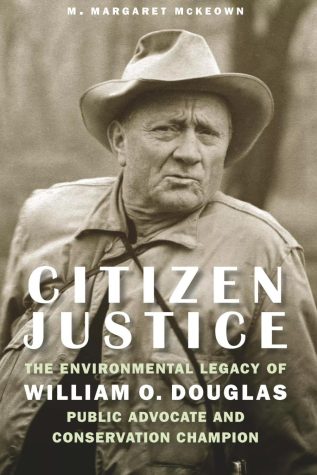Judge Margaret McKeown presents book on Justice William O. Douglas
March 9, 2023
Braving the cold outside, attendees shuffled into Olin Auditorium for this year’s Whitman-sponsored William O. Douglas lecture on March 1.
Widely regarded as Whitman’s most famous alum, William O. Douglas enjoyed the longest judicial tenure in the history of the United States Supreme Court. President Franklin Delano Roosevelt appointed him to the court in 1939, and he retired in 1975 following a stroke.
Judge Margaret McKeown presented her 2022 book “Citizen Justice: The Environmental Legacy of William O. Douglas,” which details some of the dilemmas that faced Douglas during his distinguished tenure on the court from his dueling roles as a justice and an environmental activist. McKeown has served as a judge for nearly 25 years and is currently the jurist-in-residence of University of San Diego School of Law.
“I have concerns about some of his ethical forays while serving as a justice but also being an environmental activist at the same time,” McKeown said.
Douglas was also known for his dissents, numbering nearly 500. This is a high number even taking into account his 36 years on the court.
“That reflects a comment he made when he was asked about his dissenting, and that is: ‘The only soul I have to save is my own.’ If he had a case or a principle that he felt strongly about, then he was going to dissent, whether anyone agreed with him or not,” McKeown said.

In addition to Douglas’ environmental activism, he is also widely known for his work on civil and criminal rights.
Douglas served on the Warren court and signed many landmark decisions, including Brown v. Board of Education (1954) and Miranda v. Arizona (1966), among others.
Robert Allen Skotheim Chair of History David Schmitz commented on Douglas’ impact.
“Douglas was central to the direction of the Warren Court, so he was one of the people who forged the due process revolution and other changes. He came on the Supreme Court well before Warren,” Schmitz said. “He pushed the Court in those directions.”
Associate Professor of Politics Jack Jackson has been involved in planning past lectures on William O. Douglas at Whitman. Jackson researches political theory and constitutional law.
“Justice Douglas was one of the most important justices to serve on the Supreme Court in the twentieth century, and he served on the Court for many decades (from the 1930s-1970s). To understand U.S. constitutional law and politics, an encounter with the legacy of Justice William O. Douglas is vital,” Jackson said.
Both McKeown and Jackson also mentioned Douglas’ dissent in Sierra Club v. Morton, where Douglas famously argued that nature and the environment should be able to sue in court for damages.
McKeown hopes that students will take away the importance of Douglas’ relationships to his life, as well his imperfections and willingness to disagree.
“We tend to eulogize our heroes. Douglas, I think, was both flawed and fascinating. I hope [students] will understand that he doesn’t sit in some pristine box up on a pedestal,” McKeown said. “I hope [students] will take away the importance of thinking about ethics, but I also think there is a real value to being open to dissent and being open to taking that different road.”
McKeown described the role of Whitman College in Douglas’ life as a catalyst for his later successes.
“I think Whitman was a real gift for him as a young student and being exposed to all of these ideas. He also had a lot of camaraderie here. He was in the Theta Beta [Pi] fraternity, and that meant a lot to him,” McKeown said. “As a student [you can] think, ‘Wow, this very famous guy was right here on this campus, and that was so much part of his formative years.’”





